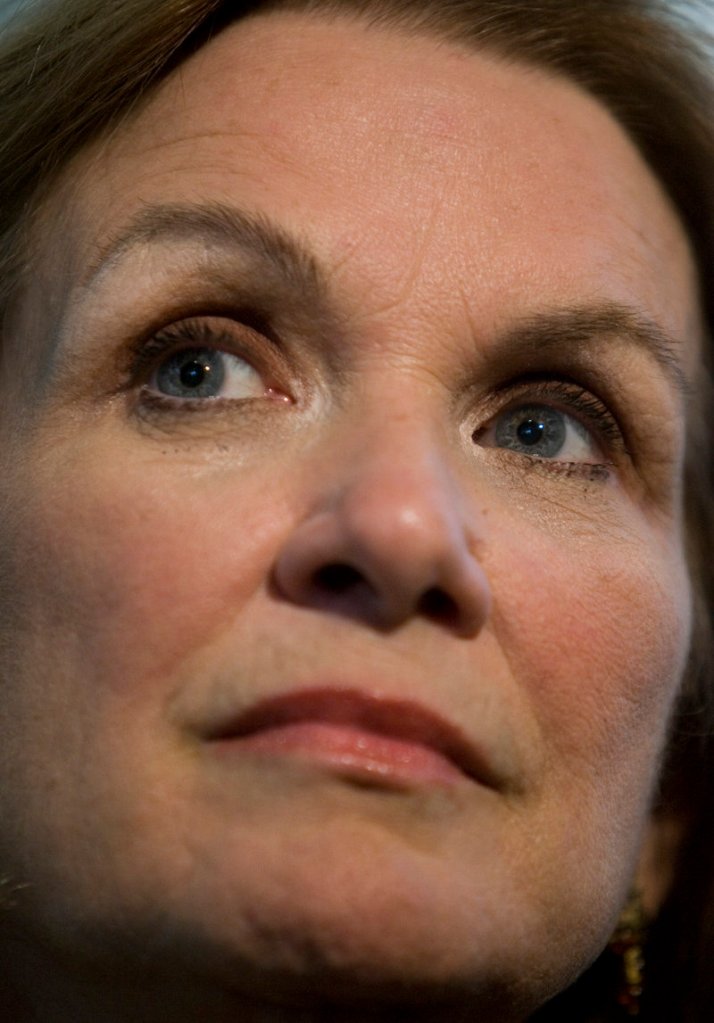CHAPEL HILL, N.C. — Elizabeth Edwards lost her hair to cancer, her son to an accident, her husband to another woman.
No wonder she called one memoir “Resilience.” And another “Saving Graces.”
Edwards’ death Tuesday at age 61 ended a struggle of extraordinary and multiple dimensions, any one of which might have consumed the more faint-hearted. She had lived side by side with high political ambition, personal betrayal, advancing disease and single-minded determination, and in her last years built a network of supporters who took life lessons from her adversities.
A public figure to the end, Edwards said goodbye to them the night before, online, after doctors had concluded they could do no more to save her. They figured she might have weeks at best; she lived hours.
John Edwards, the man she had advised as a strategist and supported as a spouse through a Senate campaign and two runs for the presidency, joined the family by her side. The couple had separated nearly a year ago, their marriage and their shared dreams of power shattered by his affair with a campaign videographer and his eventual admission that he had fathered his lover’s child.
Edwards became an advocate in her own right for health care reform and for the poor, two issues that had driven her husband, too. In that work, she lacked his clout but also his baggage.
“Our country has benefited from the voice she gave to the cause of building a society that lifts up all those left behind,” President Obama said.
Edwards was calculating and ambitious in her own right, as well. A shrewd attorney, she contributed mightily to her husband’s rise in politics and acted conspicuously to prevent his fall, his partner in hiding a secret that would come out anyway.
Two books published about the 2008 campaign characterized her as shrill toward her husband and sometimes verbally abusive to campaign staff, especially as his run faltered and tabloid reports of his affair piled up.
In a riveting moment from the Democratic presidential primary campaign, the couple stood together in apparent harmony and loving mutual support in March 2007 to tell the country that her breast cancer, diagnosed in 2004, had returned, spread and could not be cured.
His campaign would press on, she said that day, because “it’s important that the American people have the opportunity to have a president like him.”
John Edwards quit the race after poor showings in the primaries that made Obama the Democratic nominee, and he and his wife retreated almost entirely from public life.
While she pleaded for privacy after revelations of his adultery, she also wrote a memoir – her second – that discussed how the affair repulsed her. She went on “The Oprah Winfrey Show” to talk about it, but only on the condition that Winfrey not mention the woman by name.
“Nothing will be quite as I want it, but sometimes we eat the toast that is burned on one side anyway, don’t we?” she wrote in the memoir “Resilience.”
Joe Trippi, a longtime Democratic campaign consultant whom Edwards recruited to work for her husband in 2008, recalled her driving spirit.
“She was out to live every single day,” Trippi said. “She was going to live every single one of them with all the energy and grit that she could. That’s a big lesson that her life could teach all of us.”
Edwards connected easily with the public, and her battle with breast cancer resonated. She shared the most intimate details, writing and speaking about the pain of losing her hair and her efforts to reassure her young children about her future.
It was not her first experience dealing publicly with very private matters. She wrote in her 2006 memoir about the death of their 16-year-old son, Wade, 10 years earlier and the grief that consumed her for two years afterward. She spent hours at home watching the Weather Channel on mute, and broke down in tears on the floor of a grocery store after seeing Cherry Coke, Wade’s favorite soda.
“If in a restaurant, I felt Wade about to overtake me, I would go to the restroom” and take out his picture, she wrote. “If someone, anyone was there, I showed them the picture and told them about my boy. I know it made some people feel awkward – I could see it in their faces – so I was always sure to say how much it meant that they had listened.”
She was a Navy brat born in Jacksonville, Fla., and her experience attending school in Japan and living on military bases helped make her comfortable introducing herself to roomfuls of strangers.
She and John Edwards met in law school at the University of North Carolina at Chapel Hill and married the weekend after they took the bar exam. He gave her an $11 wedding ring and borrowed money from his parents to pay for a brief honeymoon.
Even as John Edwards went on to make millions as one of the nation’s most successful trial lawyers, they continued to celebrate anniversaries at Wendy’s, where they had marked their first year of marriage.
Gary Pearce, who advised John Edwards’ 1998 U.S. Senate campaign, remembered her as fragile and distant in the months before he officially joined the race as the couple grappled with the loss of their son. But she became involved and outspoken about her husband’s career once he bid for office.
“It was clear from the beginning that she was a full political partner with a lot of influence on him,” Pearce said. “She was involved on a daily basis. She was in all the strategy sessions.”
With the help of fertility treatments, Edwards gave birth to two more children, Emma Claire, now 12, and Jack, now 10. They joined daughter Cate, nearly 20 years older than her new siblings. Before her initial diagnosis with cancer, Edwards began writing a letter to her children with advice they could use after she died — such as how to choose a church or a spouse. The message became more poignant in her final years, brought home when Jack once asked who would be the grandmother to his children.
“We are not in denial,” Edwards wrote in an updated version of her first memoir published in 2007. “I will die much sooner than I want to.”
Send questions/comments to the editors.




Success. Please wait for the page to reload. If the page does not reload within 5 seconds, please refresh the page.
Enter your email and password to access comments.
Hi, to comment on stories you must . This profile is in addition to your subscription and website login.
Already have a commenting profile? .
Invalid username/password.
Please check your email to confirm and complete your registration.
Only subscribers are eligible to post comments. Please subscribe or login first for digital access. Here’s why.
Use the form below to reset your password. When you've submitted your account email, we will send an email with a reset code.